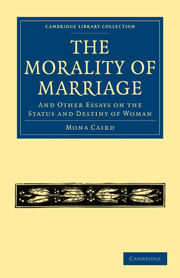PART III - THE TYRANNY OF INSTINCT
Published online by Cambridge University Press: 16 May 2011
Summary
“But the eternal world
Contains at once the evil and the cure.”
—Shelley.In the movements of modern life, the supremely momentous question is: whether we are to yield to the animal or to the human in our composition. That is to say:—are we to consult what we are pleased to term the natural constitution, or are we rather to take counsel of that element within us, which even now desires an existence impossible to us, only because men have made it so?
If the body were a rigid affair of mechanism, whose habits and needs were absolutely unmodifiable, so that, in hearkening to the human demands of our being, it were necessary to sacrifice the physical welfare, the race would, indeed, have but little to hope for. But this is far from being the case. The body can create for itself good habits and bad habits; needs which are purely artificial, yet as peremptory as the demand for food and air. It can, moreover, encourage a natural impulse to such an extent as to make its perpetual gratification a morbid necessity. On the other hand, it can emancipate itself from these claims—a process which, in the course of generations, might be carried to a far greater length than can be hoped for in one lifetime. The more common tendency, however, is to create needs, not to overcome them; and upon these created needs to found customs and establish conclusions.
- Type
- Chapter
- Information
- The Morality of MarriageAnd Other Essays on the Status and Destiny of Woman, pp. 221 - 230Publisher: Cambridge University PressPrint publication year: 2010First published in: 1897



